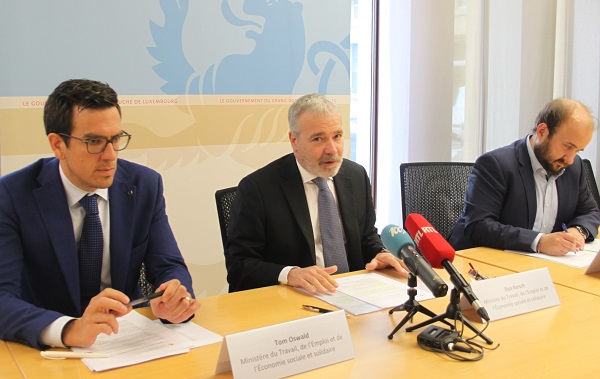 L-R: Tom Oswald (MTEESS); Dan Kersch, Minister of Labour, Employment and Social and Solidarity Economy; Pierre Hobscheit (MTEESS);
Credit: MTEESS
L-R: Tom Oswald (MTEESS); Dan Kersch, Minister of Labour, Employment and Social and Solidarity Economy; Pierre Hobscheit (MTEESS);
Credit: MTEESS
The measure allowing new fathers up to ten days paternity leave instead of two cost the Luxembourg Government some €4 million in 2018.
Luxembourg Minister of Labour, Employment and the Social and Solidarity Economy, Dan Kersch, yesterday gave an initial assessment of the new legislation on paternity leave. As of 1 January 2018, paternity leave for private sector employees in Luxembourg increased from two to up ten days.
The employee must inform his employer two months before the scheduled start of paternity leave. The leave, which can be split up, must be taken within two months of the birth of the child. The costs for the eight additional days of leave are borne by the State. Indeed, in 2018, the Luxembourg Government already reimbursed 2,751 cases for employers, amounting to a total of around €4 million. In 346 cases, the refund was refused, mainly due to a missed deadline.
On this occasion, Dan Kersch stressed that employees will retain their right to paternity leave, even if the employer is denied reimbursement. In no case may paternity leave be withdrawn from legal leave.
In order to simplify the procedures for employers, the Ministry of Labour, Employment and the Social Solidarity Economy and the State Information Technology Centre have set up a procedure on MyGuichet.lu, operational from 3 June 2019.
In addition to paternity leave, Minister Kersch provided an update on language leave. Introduced in 2009, 3,153 people have benefited in the last ten years from this extraordinary leave of 200 hours which allows the learning of the Luxembourgish language. Most of the people who took advantage of the language leave were non-resident women and the majority worked in the "Service" (1,417) and "Health and Care" (1,117) sectors.
An employee who benefits from language leave is entitled to a compensatory allowance paid by their employer. The State will then reimburse the employer 50% of this allowance and 50% of social contributions. The expenditure for this measure has so far amounted to €3.2 million.








